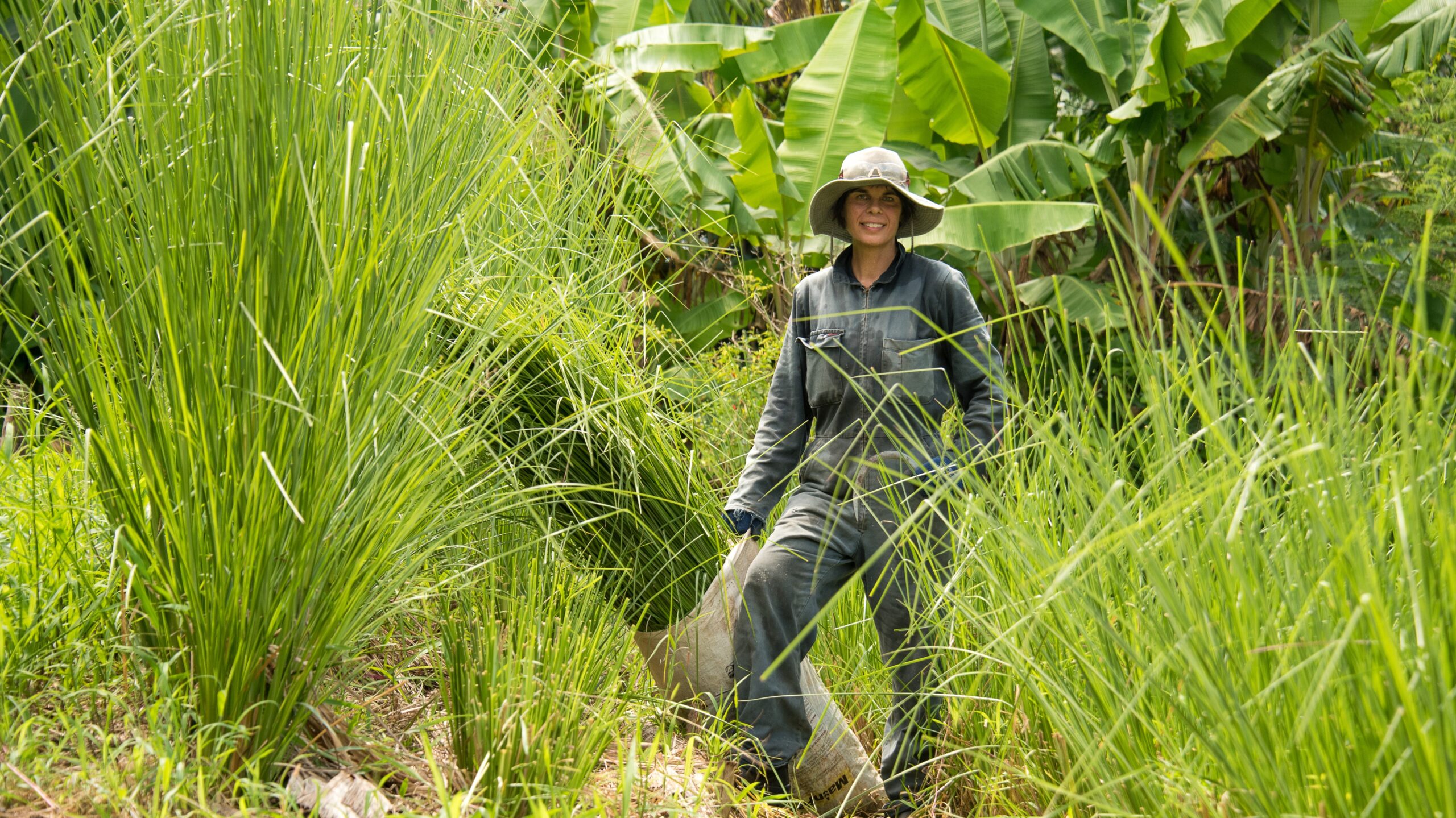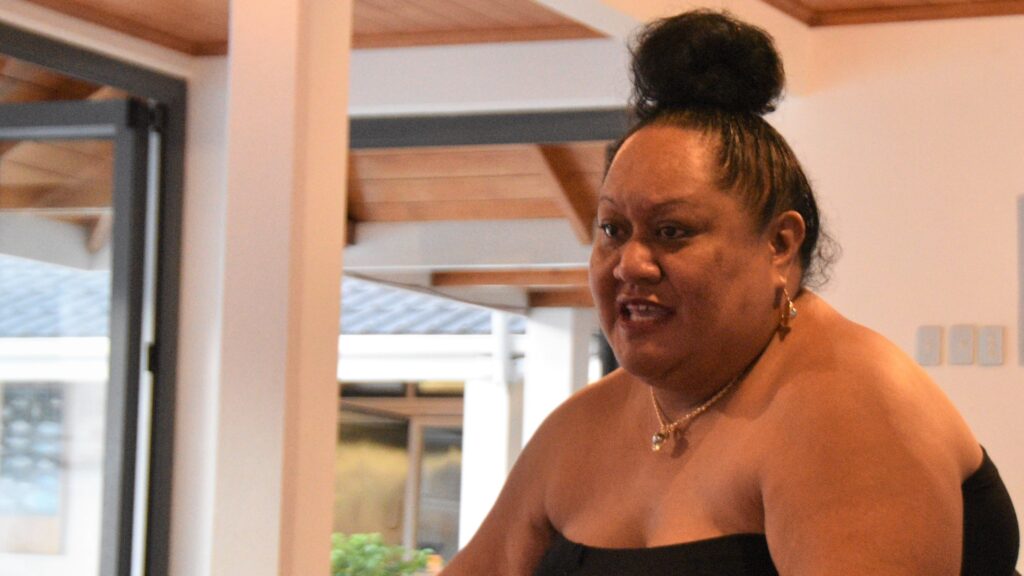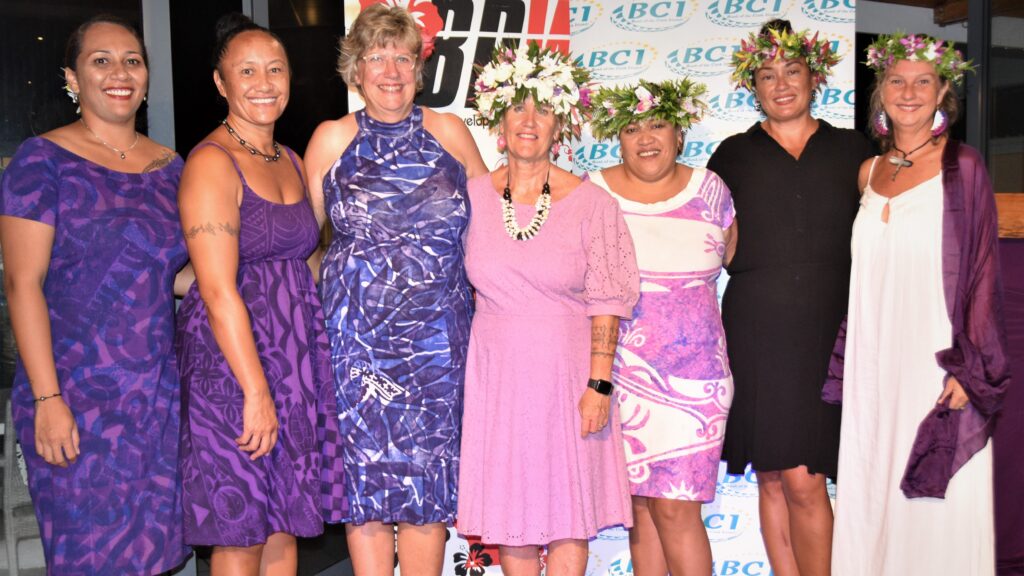Gender equality for sustainable tomorrow
Saturday 12 March 2022 | Written by Melina Etches | Published in Features, Weekend

Justine Flanagan and the “Vetiver” grass she grows on her property in Avana. PHOTO: MELINA ETCHES/22031104
In celebration of International Women’s Day 2022, five inspiring women shared their thought and passion on what drives them towards the theme of this year’s event “Gender equality today for a sustainable tomorrow”.
Dr Christina Newport – ‘Knowledge is responsibility … It’s time to flip the script’
The contribution of Cook Islands women to building a more sustainable future for all is certainly something to think about and act upon, says Dr Christina Newport, who holds Doctor of Philosophy in Development Studies.
Particularly when dominant discourses “frame us a people and a country in particular ways with taken for granted views that go unquestioned”, she adds.
As an example, Newport says based on traditional world economics there are views about the development of small islands states that are based on size, proximity to global markets, access to natural resources and sovereignty.
“So our small economy, population and land mass means we are considered insignificant in the scheme of things, we are isolated, on the fringes and out of touch; we are vulnerable to prevailing global forces and ultimately, we are not economically viable – and such discourses and narratives give rise to statements like: ‘Cook Islanders are just lazy, the Cook Islands just doesn’t have the know-how and capacity to sort out its economy without external help, climate change isn’t really such a problem. Given the declining population, they all will have left long before succumbing to sea level rise, drought, flooding and heat related diseases like dengue.”
Statements like these are “confronting”, she says.
“They speak to issues of power and domination – when we look at our history the ‘C’ word comes to mind: Colonisation! Or Capitalism and Christianity!”
Newport says it is the thinking behind these messages that we need to grapple with in order to challenge the dominate discourses and narratives that promote and perpetuate deficit messages about us, our families, communities and country.
“To do this we need to take charge of our own narratives and support each other to lead, question and reset the messages.”
Newport encourages women of the Cook Islands, “to embrace the diversity, confront the inequities, and lets ‘control the narrative’”.
“Tell our stories, present our perspectives, our experiences, insights, and our solutions. It’s time to ‘flip the script’ and lead all of us to our version of a sustainable future.”
Offering an alternative that is different to the conventional western idea that “knowledge is power” – essentially meaning that knowledge is the key to success where having knowledge can change one’s life – Newport says, “from an indigenous Pacific research perspective, knowledge is responsibility”.
She adds the importance of relationships is fundamental to indigenous island communities
“… our genealogies define who we are, where we come from; relationships give us identity, sense of belonging, sense of purpose and ties us together - and ties come with obligations and responsibilities as well as benefits, privileges and securities,” says Newport.

“In Pacific research, with a focus on relationships, it isn’t the knowledge that is of key importance, it is the relationship – the relationship between knowledge and the knowledge holder, the relationship between the knowledge holder and me the researcher and the relationship between me and the information I receive.”
Newport honour those relationships with our values of “aro’a, mana and tiaki”.
Principles such as integrity, respect and reciprocity serve to guide our intentions and actions, she says, adding “in this sense, knowledge is responsibility and we are obligated to respect those relationships that allow knowledge to be shared.”
In 2003 as part of her Master’s degree, she did a study into Cook Islands women’s spirituality and their social service practice.
Through in-depth life histories, three women discussed life events, their experiences and beliefs about Christianity, cultural spiritual practices. They discussed death, loss and grief, different crises and celebrations, tupapaku, ta’unga.
From their stories, Newport explained it was possible to understand the interconnectedness between their life events, spirituality and their social service.
“Their sharing is an undeniable act of mana and humility that is worthy of attention and respect.
“Through publicly sharing their lives in the study, they invite us to understand who they are and what they stand for.
“This is flipping the script.
“So it is from this indigenous place of understanding knowledge is responsibility, I invite you to control the narrative and flip the switch … Tell your stories that answer the call to building a sustainable future for all.”
Anna Tiraa – There is gender inequality in the Cook Islands
Ana Tiraa has spent most of her professional working life in the field of biodiversity conservation, environment and climate change.
Tiraa is currently working for the Ministry of Finance and Economic Management (MFEM) within the Development Coordination Division (DCD).
“I’m working with a dynamic team that is moving MFEM’s pipeline of Green Climate Fund projects forward,” she says.
Tiraa hails from the beautiful village of Rangiatea, daughter of Tane Tuakana Tiraa and Elizabeth Tiraa and her family connections are: Ngati Tuakana, Marama, Manavaroa, Kaitua and Uritaua.
Born in Wellington in 1987 her father and brother moved home to Rarotonga and a year later, her mother followed.
She had always strongly felt that she was a part of nature and had thought this was the same for everyone.
“In the years following my return to the Ipukarea I have learned that we have evolved with our environment,” says Tiraa.
“Greed is at the forefront of human arrogance about nature, and the reason for so many of our environmental problems we face today.”
Tiraa has worked at regional and international agencies and by far, the most satisfying and rewarding for her has always been the work she has at home, her Ipukarea, here in the Cook Islands.
For her, it’s not always about work. Throughout her life experiences she has learned, “service to your community and family is one of the biggest heartfelt joys in life”.
“Whether that service be directed at the environment, supporting family members, spiritual faith or helping your community etc.
“Service to others is important for humanity. Our world is becoming more and more self-centered, as a result we are becoming detached from each other and our surroundings.
“We need to think beyond the tip of our noses and consider how our actions impact our children, grandchildren and so on.”

Speaking on this year’s International Women’s Day theme “Gender equality today for a sustainable tomorrow”, she asks, “Is there gender equality in the Cook Islands?”.
Recently, in a stimulating discussion with friends on the topic, Tiraa says, “they believed there was no gender inequality and nor had they experienced such – after all, about half of our heads of ministries in the Cook Islands are women as one friend pointed out.”
Although the observation is true, “however, our decision makers remain mainly men”.
“Women make up 29 per cent of our parliamentarians with one woman cabinet member of six, we also know that far fewer women stand in the election than men.
“It is important to distinguish between equality and equity. Equality means receiving the same conditions and treatment regardless of your gender. Equity for example is like having quotas for females in certain spaces, it is recognised that we need equal representation in these spaces, because it leads to better, more equal outcomes for all.”
Tiraa says almost every week there is a news item about a male assaulting a female adding Cook Islands experiences a high level of domestic violence towards women and children. “Violence against women is a result of gender inequality.”
There is very little accessible data to disclose the disparity between men and women in the Cook Islands, and apart from the statistics on domestic violence, Tiraa has not been able to find a lot of concrete data on gender disparity.
“My gut feeling says there is gender inequality here, I want to make it clear gender is not about women it’s about inequalities; unfortunately, inequalities are directed at mostly women.
“If there is no equality in the system, the world, your community and your family suffer. It will be like a circle that goes around and round.
“Gender equality is not only a fundamental human right, but a necessary foundation for a peaceful, prosperous and sustainable world for tomorrow.”
Justine Flanagan – ‘Vetiver’ - A truly sustainable technology
When Justine Flanagan moved home to Rarotonga, her family gave her a piece of land in the Avana foothills.
It represented a place – a place to put down roots, to raise a family, to grow food, to grow old, and to eventually pass on to the next generation, Flanagan says.
However, her section was densely covered in bush of the invasive African tulip, venevene and two-storey high au.
“The bush was so dense that we couldn’t see the shape of the land at all.”
With her husband Andy and their two little boys they cleared the section by hand, using handsaws and machete.
Once the bush was cleared, a very steep section was discovered (no flat land), “and if we didn’t stabilise the slope, it was going to tumble down the hill”.
Stabilising a slope using conventional methods like bringing in the diggers, trucks and building retaining walls was expensive.
“Fortunately, we had an alternative – the Vetiver System.”
Flanagan explains vetiver is a tropical grass, the leaves are long thin blades that grow up to two metres high, it can be trimmed down to 30 centimetres and the strong, fine, fibrous roots grow to a depth of three metres and it grows straight up and straight down.

“It doesn’t interfere with other plants, trees or crops; in fact, it is highly beneficial.
“It is non-invasive with no viable seeds or runners. It doesn’t spread. It stays where you plant it.
“It is fast-growing; easy to maintain; it has no pests, no diseases; it is perennial (endlessly regenerating, lasting forever).”
Vetiver grows in all soil types: compact, loose, sandy, dry, water-logged, and it can even grow on water on pontoons.
Flanagan believes that if she hadn’t addressed the surface water on her section using vetiver, it would contribute to the flooding further down, impacting her neighbours, their properties, their crops, flooding roads, bridges and contributing to the wear and tear on the island’s infrastructure.
“It is socially, environmentally, and economically responsible for me to keep the soil and water on my land, it is in my own best interests too – those are assets.”
Flanagan says the method her family adopted “is bio-engineering, based on over 30 years of research and development; technical specifications; experts, implemented in over 100 countries to demonstrate its effectiveness”.
“It works with nature – and it is scalable.”
Compared with conventional engineering, she is confident that the vetiver system uses far less resources, and it’s more resilient – no concrete, no steel, no mining, no extraction, no manufacturing, no waste, no importing.
“A truly sustainable technology.”
Tessa Vaetoru - Challenges make us stronger
Tessa Vaetoru was born and raised in Manihiki, on the islet of Tauhunu.
Her childhood was absolute bliss, says Vaetoru, adding “we were resilient and we were strong and innovative”.
“We had many struggles growing up with climate change, we had droughts, cyclones, storm surges and we were all challenged by these on a small island, but it made us strong and it made us resilient and I am absolutely proud of that.” Vaetoru says her childhood and upbringing is the reason why she is so passionate about her work today. She is the development programme manager at the Ministry of Finance and Economic Management (MFEM).
In her presentation, Vaetoru recalled the year of 1997 when Cyclone Martin tragically claimed 28 lives on the northern group island, left buildings destroyed, communities and homes lost and its environment devastated with millions of dollars in damages and 360 people were evacuated and displaced, with most having never returned.
She says events like Cyclone Martin “impact our communities, also the reason why I love my job today, ensuring that we are proactive in this space by establishing mechanisms to ensure we are prepared but also to enable us to build back better”.
Reflecting on the International Women’s Day, Vaetoru says it’s a day to “celebrate our passion, our courage, our struggles but also our determination”.
“As we listen to our vaine toa, and hear of their stories, it will begin to show that women are essential to achieving our resilience but also our sustainable development.”

She pays “homage to some of the inspirational, highly driven women who were catalysts in the woman I would later become” – Krystina Kauvai-Tatuava, Elizabeth Wright-Koteka, Lavinia Tama and Talissa Koteka.
“Without them I wouldn’t be where I am today or the woman I am today.”
Jamie Short – Public transport for a low carbon economy
“If we truly want to commit to a low carbon economy, public transport is a significant part of the solution,” says Jamie Short.
Short is the programme coordinator at the Ministry of Infrastructure and Planning.
She acknowledged that public transport is often seen as form of transport for low socioeconomic groups, “and a difficult task is to change perception of the bus being uncool or for disadvantaged people, so having local celebrities and workplace leaders promote and be seen to use the bus service should encourage others”.
Of the 10 million tonnes of carbon dioxide emitted worldwide, three quarters are attributed to transportation, primarily transportation by road, and many countries are targeting transport to reduce their greenhouse gas emissions through transitioning to low carbon-based transport, explains Short.
“Land transport contributes up to 39 per cent of total emissions for the Cook Islands. On average, moving drivers out of cars and into a bus can take thirty cars off the road thereby reducing emissions even if buses remain fossil fuelled.
“Moving people out of cars means we build less for cars and more for people and save land for those ecosystem services.”
Amongst other factors, public transport reduces congestion, toxic pollution, the risk of road accidents, reduces congestion, reduces the risk of road accidents and can reduce the cost of living.
“And cars sit unused 90 per cent of the time we own them, yet they cost us lots of money for purchasing, often through a loan, servicing, fuelling, annual registrations and insurance.”
It is well-known that the Cook Islands has a growing problem of non-communicable diseases and obesity and if the bus became a regular form of transport, Short is convinced more people would be active to and from bus stops, which “should improve health and wellbeing”.
In Rarotonga, Cooks Bus Passenger Transport Services (Cooks Buses) has been providing bus service for 30 years.
Short says: “The bus service is predominantly seen as a form of transport for tourists and school children.”
“How can we be convinced to use the bus for at least our regular trips to work and school?”
“Affordability is an incentive to catch the bus, and reducing the cost of fares can attract ridership, and Government subsidisation could be introduced to reduce the cost of fares… and perhaps free Wi-Fi on the bus would help increase ridership.”
Workplaces could encourage the use of public transport and disincentives can be created to discourage the use of personal vehicles such as introducing paid parking in Avarua, she adds.
“We must also be careful not to cause injustices against vulnerable groups and benefits to the higher income groups.
“Perhaps one day Rarotonga will have a well-used, low-carbon public transport system, supported by Government that makes it possible to not own a personal vehicle, thereby releasing people of that expense if they choose to.”
Short ended her speech with a quote by Elijah Cummings, “Our decisions on transport are much more than where roads or bridges are built. They determine the connections and barriers that people will encounter in their daily lives, and thus how hard or easy it will be for people to get where they need and want to go.”












































